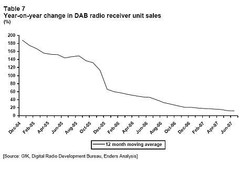DAB vs. internet: vested interests limit progress
Digital radio critic claims consumers being mislead
Sign up for breaking news, reviews, opinion, top tech deals, and more.
You are now subscribed
Your newsletter sign-up was successful

In my opinion, the manufacturers use the term "digital quality sound" to make it sound as though DAB provides CD quality sound, so it's a blatant attempt at conveying the message that DAB provides high audio quality. In reality, that couldn't be further from the truth.
Then there's the claim that the BBC originally began promoting DAB on the basis that it provided higher quality, but as this didn't prove to be very successful the BBC decided to launch new stations instead, and it was this that led to DAB sales taking off. I'm sorry, but that simply isn't remotely true. The BBC had always intended to launch new stations, and there's an article on the BBC website from September 1998, which shows that the BBC was already planning on launching five new stations then, and that was around two years before the first DAB receivers went on sale!
The reason why DAB sales took off was simply because of the saturation TV advertising the BBC lavished on its favoured digital radio system. Over the period from 2002, when the BBC launched its five digital-only stations, up to 2005, the BBC broadcast 19 TV advertising campaigns for DAB. However, as the chart here [top right] shows, as soon as the BBC temporarily stopped broadcasting any TV ad campaigns for DAB in 2006 and 2007, DAB's year-on-year sales growth plummeted, and the sales growth – which is an indicator of how well an emerging technology such as DAB is doing in the marketplace – has continued to slide ever since.
So why was the quality of DAB radio reduced? That still seems to be a key reason for the anti-DAB sentiment that still exists today.
The BBC decided to add five stations to its national DAB multiplex when there was only room to fit two stations in, so the BBC simply chose to degrade the audio quality in order to fit the new stations in. The sad fact is that the reason why DAB receives so much criticism is that there was never actually any need for the broadcasters to degrade the quality in the first place. Development of the AAC audio codec began in 1994, and it was standardised in 1997. So if the BBC executives in charge of planning DAB in the 1990s had actually listened to what the BBC R&D engineers were telling them about the advantages that AAC had to offer, they could have upgraded the DAB system prior to the big launch in 2002, and the audio quality on DAB would have been good today, not poor.
Do you think DAB would have faired better if they had upgraded the system prior to its launch?
Definitely. Ironically, DAB's current woes are largely attributable to the fact that they didn't upgrade the system when they had the opportunity to do so in the 1990s. Other European countries ended up turning their noses up at using DAB precisely because the technologies it uses are so out of date, which is what led to DAB+ having to be designed in 2006. This led to DAB effectively being a UK-only market in terms of sales, which in turn led to the car and mobile phone manufacturers choosing not to integrate DAB into their products, because they will only integrate Europe-wide standards, not something that's effectively limited to just the UK.
Sign up for breaking news, reviews, opinion, top tech deals, and more.
Current page: Why is DAB associated'digital quality sound'?
Prev Page Why is the the government so keen to back DAB? Next Page DAB on mobiles and in cars